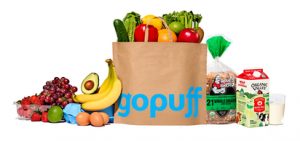Gopuff, Misfits Market Team to Deliver Fresh Grocery Assortment
 Gopuff has launched a comprehensive and affordable Fresh Grocery assortment powered by Misfits Market. Combining Gopuff’s leading instant delivery with great value driven by Misfits Market’s differentiated sourcing model, the partnership will deliver an extensive range of more than 300 items, including fresh fruit and vegetables, dairy, meat, poultry, fresh bread and more, to customers’ doors in as fast as 15 minutes.
Gopuff has launched a comprehensive and affordable Fresh Grocery assortment powered by Misfits Market. Combining Gopuff’s leading instant delivery with great value driven by Misfits Market’s differentiated sourcing model, the partnership will deliver an extensive range of more than 300 items, including fresh fruit and vegetables, dairy, meat, poultry, fresh bread and more, to customers’ doors in as fast as 15 minutes.
“We are thrilled to unveil our Fresh Grocery initiative today. By capitalizing on our vertically integrated model and expansive scale, Gopuff is uniquely equipped to deliver high-quality fresh produce and groceries at very affordable prices,” said Yakir Gola, Gopuff co-founder and co-CEO. “We are proud to partner with Misfits Market to make it possible for our customers to get 300+ fruits, vegetables, dairy, poultry, fresh bread and more in as fast as 15 minutes. The addition of fresh grocery on top of Gopuff’s existing 5,000 everyday essentials brings us one step closer in achieving our mission of maximizing every moment in our customers lives and marks a transformative advancement for our customers.”
During pilot testing, one-quarter of all orders in test markets contained Fresh Grocery items and, as the company continues to invest in strategic initiatives to drive growth, Fresh Grocery has led to 20% bigger baskets and more than 50 percent increases in sales for produce, dairy, prepared foods and meat. Today, the Fresh Grocery assortment is available to customers in most major metros with expansion to additional Gopuff micro-fulfillment centers to follow.
 To bring its Fresh Grocery offering to life, Gopuff partnered with Misfits Market, the online grocer that reduces food waste and makes shopping for sustainable, high-quality groceries easier and more affordable. With Misfits Market delivering to Gopuff’s micro-fulfillment centers almost daily, Gopuff offers the freshest food at affordable prices. FAM members can get up to 50 percent off fresh groceries, a banana for just $0.25 each, an avocado for $0.59 cents and organic eggs for only $2, alongside thousands of everyday essentials, all delivered in a single order in as fast as 15 minutes.
To bring its Fresh Grocery offering to life, Gopuff partnered with Misfits Market, the online grocer that reduces food waste and makes shopping for sustainable, high-quality groceries easier and more affordable. With Misfits Market delivering to Gopuff’s micro-fulfillment centers almost daily, Gopuff offers the freshest food at affordable prices. FAM members can get up to 50 percent off fresh groceries, a banana for just $0.25 each, an avocado for $0.59 cents and organic eggs for only $2, alongside thousands of everyday essentials, all delivered in a single order in as fast as 15 minutes.
“Extending our food value supply chain to power Gopuff’s fresh grocery expansion gets us one step closer to our vision of reimagining the food system and eradicating food waste,” said Misfits Market founder and CEO Abhi Ramesh. “We share a passion for making nutritious food more accessible and saving food from waste. With Gopuff leveraging our sourcing and supplier relationships, together we can provide savings for American consumers who continue to face inflated prices at traditional grocery stores.”
Gopuff, which completed more than 4 million orders to customers in food deserts in 2023, is uniquely positioned to help address food accessibility – a critical issue in many of the communities where it operates. With its expansion into Fresh Grocery, Gopuff has the power to help more Americans access the fresh, high-quality food and groceries they need.
The launch comes on the heels of Gopuff joining the White House Challenge to End Hunger, where the company committed to donating millions of pounds of food to local food banks and partnering with local governments to ensure resources are made available where they are needed.
Over the past two years alone, Gopuff locations have donated nearly 2 million pounds of food to the Feeding America network of food banks. In 2023, Misfits Market donated nearly 6 million pounds of food to 67 food pantry partners as well as 1.5 million meals to Feeding America ($1 helps provide at least 10 meals secured by Feeding America on behalf of local member food banks). Gopuff also recently partnered with The Greater Boston Food Bank, participating in the organization’s annual Day of Giving by volunteering to answer phones and donating $50,000 to support the fight against hunger.
Gopuff is the leading Instant Commerce platform, bringing thousands of everyday products to customers in as fast as 15 minutes. Gopuff stores everything from household essentials and groceries to OTC medication and more within hundreds of micro-fulfillment centers and omnichannel retail stores across the United States and United Kingdom. Founded in 2013 by co-founders and co-CEOs, Rafael Ilishayev and Yakir Gola, Gopuff’s unique, vertically integrated platform offers customers a seamless and consistently fast shopping experience.
To learn more, visit www.gopuff.com or follow Gopuff on Facebook, Twitter or Instagram. Download the Gopuff app on iOS and Android.
Misfits Market, the direct-to-consumer online grocer that reduces food waste and makes shopping for sustainable, high-quality groceries easier and more affordable, delivers value by making it convenient to shop, eat, and live better. The company has created the first-of-its-kind food value supply chain focused on building relationships with farmers, distributors, and producers to eliminate food waste while expanding food access. Misfits Market delivers rescued and upcycled foods as part of its full selection of groceries to nearly every zip code in 48 states at up to 30 percent off traditional grocery store prices. In 2024, the company launched Fulfilled by Misfits, a dedicated B2B service for perishable brands to store, pick, pack, fulfill, and deliver their products nationwide via Misfits Market’s logistics platform. To learn more and order your first box, visit misfitsmarket.com or follow Misfits Market on Facebook, Instagram, and YouTube. Download the Misfits Market app on iOS and Android.
For more news of interest to the food delivery industry, subscribe to Gourmet News.
Harry Potter Kinder Joy Collection Available for Limited Time
Ferrero North America, the makers of Kinder Joy, the delicious treat plus toy made to help parents create everyday surprises for their children, is partnering with Warner Bros. Discovery Global Consumer Products and Funko, for a of Harry Potter Kinder Joy Eggs. The assortment features 16 Funko toys specially designed to bring families together to create magical memories. This limited-edition lineup includes two pencil toppers, two sticky notes, two bookmarks and 10 Funko figurines that include Harry Potter, Ron Weasley, Hermione Granger, Draco Malfoy, Professor Dumbledore, Hagrid and more.
In celebration of this new collection, Kinder Joy is partnering with the beloved Harry Potter film actor and everyone’s favorite Slytherin, Tom Felton.
“Kinder Joy’s ability to capture some of the magic of the franchise gives fans a new way to experience its excitement and allows its legacy to be passed along to an all-new generation of witches, wizards and Muggles,” said Felton. “Through playing Draco Malfoy in the Harry Potter films I have seen firsthand how connected the fans are and I can’t wait to see how much they enjoy the Harry Potter Kinder Joy eggs.”
Fans, parents and children alike will be able to discover the full Harry Potter collection which includes the iconic Kinder Joy treat featuring delicious layers of cocoa and sweet-cream and topped with crispy wafer bites filled with cocoa cream. All 16 toys can also be scanned and brought to life in Applaydu, an app that uses augmented reality to extend playtime. The free app is available for download on the App Store and Google Play.
“We are excited to bring the new Harry Potter collection to families and have Kinder Joy be a part of those special moments of wonder shared between parents and children,” said Amber Hansinger, vice president of marketing for Kinder Joy. “Harry Potter is a franchise loved by people of all ages, and through this collection, we are hoping to play a small part in how parents introduce their kids to the iconic Harry Potter films.”
The Kinder Joy Harry Potter toy collection is available nationwide while supplies last. For more information on the Kinder brand and where to find Kinder Joy eggs in retail, please visit www.Kinder.com as well as the pages for Kinder US on Facebook, X and Instagram.
Kinder Joy is part of the portfolio of brands by Ferrero U.S.A., Inc., the confectionery company known also for Ferrero Rocher, Tic Tac and Nutella The Original Hazelnut Spread. Kinder Joy first broke onto the U.S. confectionery scene in 2018, quickly winning over American consumers with its delicious creamy layers, chocolate-covered wafer bites and exciting surprise toy. It has quickly become a beloved treat and toy, earning the title of “2019 Product of the Year” within the Kids Novelty Snack category by Product of the Year USA. For more information on the Kinder® brand and where to find Kinder Joy® eggs in retail, please visit www.Kinder.com, Kinder US Facebook, X, and Instagram.
Ferrero began its journey in the small town of Alba in Piedmont, Italy, in 1946. Today, it is one of the world’s largest sweet-packaged food companies, with over 35 iconic brands sold in more than 170 countries. The Ferrero Group brings joy to people around the world with much-loved treats and snacks including Nutella, Kinder, Tic Tac, and Ferrero Rocher. More than 38,000 employees are passionate about helping people celebrate life’s special moments. The Ferrero Group’s family culture, now in its generation, is based on dedication to quality and excellence, heritage and a commitment to the planet and communities in which we operate.
Ferrero entered the North American market in 1969 and has grown to more than 5,100 employees in 15 plants and warehouses, and eight offices in North America across the United States, Canada and the Caribbean. It has expanded its presence and portfolio with the addition of iconic brands such as Butterfinger®, CRUNCH®, Keebler®, Famous Amos®, Mother’s Cookies®, and other distinctive cookie and chocolate brands. Follow @FerreroNACorp on Twitter and Instagram. www.ferreronorthamerica.com.
From the moment 11-year-old Harry Potter met Rubeus Hagrid, Keeper of Keys and Grounds at Hogwarts School of Witchcraft and Wizardry, his adventures have left an indelible mark on popular culture. Today, over 25 years later, the Harry Potter phenomenon thrives as one of the most successful and best-loved entertainment properties in history.
J.K. Rowling’s best-selling Harry Potter novels have been brought to life in an ever-evolving, interconnected universe which is loved by millions of fans worldwide. Eight blockbuster Harry Potter films and three epic Fantastic Beasts films bring the spellbinding action to life on screen, Harry Potter and the Cursed Child mesmerizes on stage, and state-of-the-art video and mobile games from Portkey Games allow players to experience the wizarding world like never before. Fans can proudly showcase their passion through innovative consumer products, and thrill at spectacular location-based experiences – including five theme park lands at Universal Studios locations around the world.
This expanding portfolio of Warner Bros. Discovery-owned Harry Potter and Fantastic Beasts offerings includes ground-breaking touring experiences and events, each developed to celebrate special moments and locations that fans cherish, as well as the Platform 9 3⁄4 retail shops and iconic flagship store – Harry Potter New York. Wizards, Witches and Muggles alike can also discover something new as they explore behind-the-scenes secrets at Warner Bros. Studio Tour London – The Making of Harry Potter and Warner Bros. Studio Tour Tokyo – The Making of Harry Potter.
With a new Max Original TV series based on the Harry Potter books on the way, this extended world continues to provide the community with fresh and exciting ways to interact. For its global fans, and for generations to come, it invites everyone in to find the magic for themselves.
For the latest Harry Potter and Fantastic Beasts news and features, visit www.wizardingworld.com.
Warner Bros. Discovery Global Consumer Products, part of Warner Bros. Discovery Global Brands, Franchises and Experiences, extends the company’s powerful portfolio of entertainment brands and franchises into the lives of fans around the world. WBDGCP partners with best-in-class licensees globally on award-winning toy, fashion, home décor and publishing programs inspired by the biggest franchises from Warner Bros.’ film, television, animation, and games studios, HBO, Discovery, DC, Cartoon Network, HGTV, Eurosport, Adult Swim, and more. With innovative global licensing and merchandising programs, retail initiatives, and promotional partnerships, WBDGCP is one of the leading licensing and retail merchandising organizations in the world.
Headquartered in Everett, Wash., Funko is a leading pop culture lifestyle brand. Funko designs, sources and distributes licensed pop culture products across multiple categories, including vinyl figures, board games, action toys, plush, apparel, housewares and accessories for consumers who seek tangible ways to connect with their favorite pop culture brands and characters. Learn more at https://funko.com/, and follow us on X (@OriginalFunko) and Instagram (@OriginalFunko). Loungefly™ are registered trademarks of Funko, LLC.
For more news of interest to the novelty candy industry, subscribe to Gourmet News.
Swamp Dragon Hot Sauce Reluctantly Suspends Operations
 Matt Beeson created Swamp Dragon hot sauce for those who love hot sauce but don’t like the vinegary taste. Beeson created the world’s first hot sauce made with liquor as a preservative, not vinegar. He put a lovable dragon cartoon on the label, so families would know it’s still kid-friendly.
Matt Beeson created Swamp Dragon hot sauce for those who love hot sauce but don’t like the vinegary taste. Beeson created the world’s first hot sauce made with liquor as a preservative, not vinegar. He put a lovable dragon cartoon on the label, so families would know it’s still kid-friendly.
Making Swamp Dragon and growing the brand was a passion for Beeson. He’s been networking to find the resources to keep Swamp Dragon going, but has been unable to. (Read more in the April/May issue of Gourmet News.) Now, Beeson has made the heartbreaking decision to suspend operations.
“Swamp Dragon is officially suspending operations,” Beeson wrote on his LinkedIn page, the company website and other social media, this time featuring a sad dragon. “We will continue filling web orders until inventory depletes (very soon, so go now if you care to), and then the company will remain idle until I fix things.
“I am sorry that most or none of you have had, and may never have, Chocolate Bourbon Hot Sauce or Piña Colada Hot Sauces. The flavors I am able to achieve without vinegar are unlike anything before, and cannot be had by any other than my patented method.
“This company and invention is a source of deep pride for me. Suspending the operation does not change that. With the help of supporters, family, volunteers and more, Swamp Dragon made a very real splash. Alas, with insufficient funding, the runway WILL expire. It did.
“As I suspend things, I walk away from massive sales and business opportunity that was always and still is there. The product is delicious, incomparable, and very easy to sell. It’s a f$%King shame of the highest order.
“Hopefully soon, I will have the necessary resources to relaunch properly. Thank you all so very much for your support, advice, patronage, and love.
“I cannot say with any certainty that I will relaunch. But it is the plan. Don’t give up on me.
:Now that’s out, so maybe I can get a little more vocal about finding my next job. Hire me!”
Once again, Gourmet News will feature more on Beeson’s quest to save Swamp Dragon in the April/May issue. Subscribe now so you don’t miss it!







